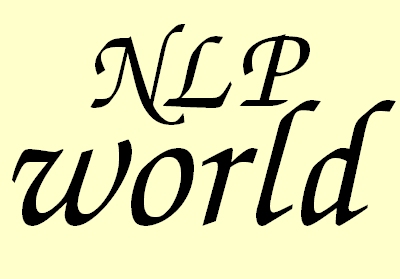NLP World Volume 2 (1995)
Original back issues are US$24, £15, €16 or CHF 20 each, including post & packing.
They are also available as pdf files at US$6, £4, €4 or CHF 5 each.
The pdf files will be sent to the email address you provide.
See the summary page for details of how to order.
Volume 2 No 1 March 1995
Articles
-
A New Coding of NLP was developed by John Grinder and Judith DeLozier in the early 1980s as a way to bring wisdom into the original technology and procedures of NLP. Judith describes the history, the seven elements which together make up New Code NLP, and an exercise in Active Dreaming. She concludes that the latest developments in NLP attempt to resolve the paradox of how to systematically model something when all codes (maps) can only partially reflect the holistic nature of systems.
- You may enjoy reading about how you can use modals to influence states. You do not have to read this article and allow yourself to become even more conscious of how you might shape your language to smoothly direct emotional attention. It’s is only something you could do when you want to and you feel curious about how you are going to increase your potential to help others.
Peter Wrycza, Maps Beyond the Mind: NLP and spirituality
Reviews (reviewers in brackets)
D
& J Chong: The Knife without Pain (Ian McDermott and Joseph O’Connor)
Diana Beaver: Lazy Learning:
making the most of the brains you were born with (Peter Wrycza)
Clare Rushworth: Making
a Difference in Cancer Care (Jacky Walker)
Delozier & Grinder: Turtles All the
Way Down (Susan Grace Branch)
Volume 2 No 2 July 1995
Articles
Sue Knight, NLP and the Learning Organization
-
Franco
& Menezes, NLP: an Appropriate Tool for Creating a Learning Organization
- NLP can contribute significantly to the creation of a learning organization by providing insights that enable stable and ecological changes. The training of NLP techniques alone are in general not enough to achieve very stable results. An adequate orchestration of the use of NLP framework and integrative learning concepts can lead to long term changes.
-
Jay
W Spechler, Modeling Excellence in Business
- A process for modeling excellence in business using as examples the author’s modeling corporate Chief Executive Officers’ behaviors, and the most successful disability management programs in the United States. Specific NLP techniques and processes are shown to result in a high level of knowledge elicitation, and executive participation in the development of the author’s book, Reasonable Accommodation.
-
Richard
Bolstad, NLP and the Five Elements: using NLP to heal the systemic imbalances
behind ‘illness’
- At the base of the Chinese traditional medical system is the model of five different phases that any energy system (including the human mind-body system) cycles through.This article explains how each specific physical dis-ease is a result of the effects of a metaprogram-like energy imbalance in ONE of the five phases. By identifying which of the five is out of balance, we can customize NLP processes to treat the core emotional issues essential to a particular person’s wellbeing and health.
Dmitry Sokolov, A Fairy-Tale for Correcting an out-of-conscious Sensory System
Marion Brion, The Supervision of NLP Therapists
Reviews (reviewers in brackets)
Daniel Alkon:
Memory’s Voice: Deciphering the Mind-Brain Code (Brian Van der Horst)
Francis Crick: The
Astonishing Hypothesis (Brian Van der Horst)
Allan Hobson: The Chemistry of Conscious States (Brian Van der Horst)
Bart Kosko: Fuzzy Thinking: the new science of fuzzy logic (Brian Van der Horst)
Stephen
Kosslyn: Image and the Brain (Brian Van der Horst)
Roger Penrose: Shadows of the Mind (Brian Van der Horst)
John Searle: The Rediscovery of the Mind (Brian Van der Horst)
Michael D Yapko: Suggestions
of Abuse: true and false memories of childhood sexual trauma (Ian McDermott and Joseph O’Connor)
Michael D
Yapko: Suggestibility and Illusory Memories in the Therapeutic Setting (idem)
Steve de Shazer: Words Were Originally Magic (Harry Norman)
Sue Knight: NLP
at Work: the difference that makes the difference in business (Mark McKergow)
Volume 2 No 3 November 1995
Articles
Nelson Zink and Peter Wrycza, Levels of Development
-
Lucas
Derks, The Social Panorama
- A person’s social panorama consists of social representations around the self. Location (distance and direction) seems to be the critical submodality. Social relations and behaviour are changed when the location of social representations are changed. Exploring the social submodalities enriches NLP work with groups, teams, and social systems in general.
Jules
Hancox and Andy Bass, Experimental Paradigms in Analysis of NLP
Michael
Hall, The New Domain of Meta-States in the History of NLP
Mariana Funes, How Do You Decide What is Important?
Review (reviewers in brackets)
Shelle
Rose Charvet: Words that Change Minds: mastering the language of influence (Ian McDermott and Joseph O’Connor)
Announcement of ‘NLP Abstracts’
Forward to Volume 3 1996
Back to NLP World’s home page.

